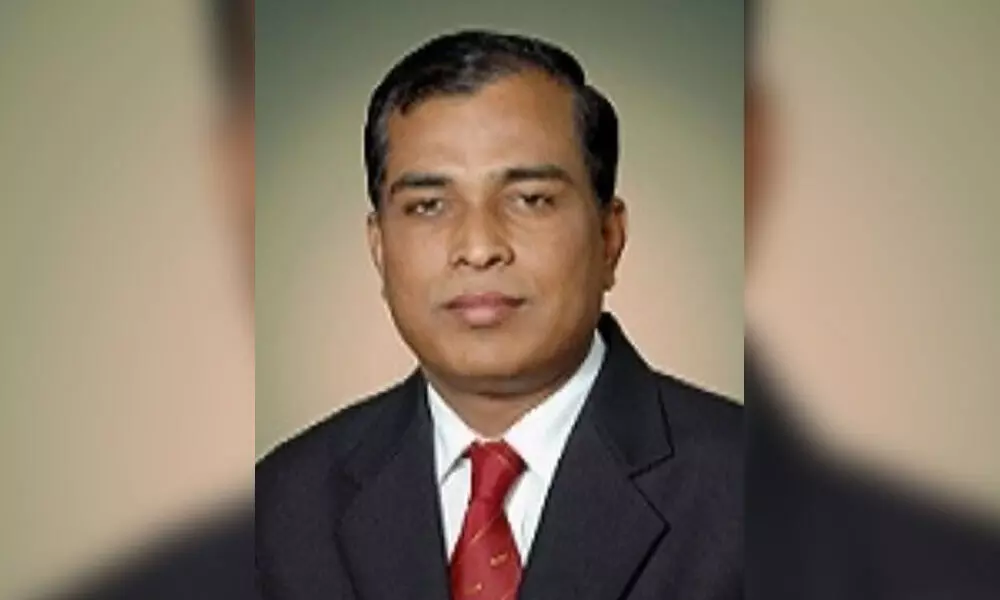Live
- Seven-day national mourning in respect of Dr. Manmohan Singh
- 'I've lost a mentor and guide': Rahul Gandhi grieves demise of Dr. Manmohan Singh
- 'Great loss for all of us': President Droupadi Murmu mourns Manmohan Singh's demise
- Dr Singh presented milestone budget of 1991 which liberalised Indian economy: FM Sitharaman
- PM Modi condoles demise of Dr. Manmohan Singh
- Former Prime Minister Manmohan Singh Dies at 92: A Legacy of Economic Reforms
- Nagesh Trophy: Telangana, Gujarat dominate action on Day 4 with easy wins
- Get Ready for Dreame Technology’s Year-End Amazon Sale – Big Savings on Smart Home Products
- FIR registered as 4 voter forgery cases come to light in Delhi's Okhla constituency
- Ayodhya Ram temple to host majestic anniversary celebrations on Jan 11 with devotional, cultural programmes
Just In
Ancient education system laid focus on everyone's skills: Kori


Central University of AP Vice-Chancellor S A Kori
AP Central University VC S A Kori says the varsity education should be holistic in nature to inculcate knowledge and skills necessary to shape an individual’s personality and career
Anantapur: Universities need to urgently engage in critical review and discovery of contemporary roots in their own indigenous cultures in fields like health sciences, agriculture, social sciences, architecture, mathematics, logic, philosophy, the fine, visual and performing arts, observed Central University of AP Vice-Chancellor S A Kori, on an online workshop on re-building Indian universities, in the context of implementation of the New Education Policy by the Union government.
Kori maintained that India's contribution to the world dates to thousands of years back. Although India became independent in 1947, its history, culture and science extend back to thousands of years in antiquity. Panini, a Sanskrit Grammarian, gave a comprehensive and scientific theory of phonetics, phonology and morphology. Charaka was a practitioner of the traditional system of Indian medicine known as Ayurveda. He introduced systemic perspectives for understanding biological change, cause-effect relationship, and evidence-based approach to medicine.
Sushruta is considered the father of surgery. Kautilya's Arthashastra is considered a classic in political economy. Aryabhatta was a great astronomer and mathematician, who proclaimed that the earth is round, that it orbits the Sun and that it is suspended in space. His most significant contribution is the concept of zero. Nagarjuna isa name synonymous with alchemy, chemistry and metallurgy. Bhaskaracharya was a great mathematician and astronomer.
Delving deep into the India's achievements, he pointed out that India was known for the 15 universities that existed from 6th century BC to 1200 AD. Takshashila is known to be the oldest.
Nalanda was established in the 5th century and remained the centre of excellence till it was destroyed in the 12th century AD. Dominant schools of thought-systems represented by various darshanas form the philosophical foundations of Indian knowledge and education system. It is estimated that in 600 BC the ashram system gradually evolved in several multidisciplinary
universities such as Takshashila, Nalanda, and Vikramshila.
Indian knowledge systems were completely sidelined or replaced with western systems during the British rule, be it sciences, humanities, engineering, or medicine. Establishment of convent schools, colleges, and universities in Mumbai, Kolkata, Chennai and
many other cities set off the process of establishing British education system in India.
The major difference between ancient Indian education system and the modern education system seems to that the former was in a gurukula and the latter is under a kulaguru. The ancient Indian education system was much more refined and advanced than the modern education system. It focused on everyone's skills and abilities, helping them learn the art of living. Though the students were from different backgrounds,
all were equal. It was holistic education. Upanishad means "be seated at the feet of the Guru to receive the teaching."
Vice-Chancellor Kori felt that university education should be holistic in nature to inculcate knowledge and skills necessary to shape an individual's personality and career.
For a young democracy like India, university education plays a very vital role in enhancing the benefits of demographic dividend. Appropriately guiding the youth of our country fulfill their aspirations and empowering them to contribute to nation building.

© 2024 Hyderabad Media House Limited/The Hans India. All rights reserved. Powered by hocalwire.com






